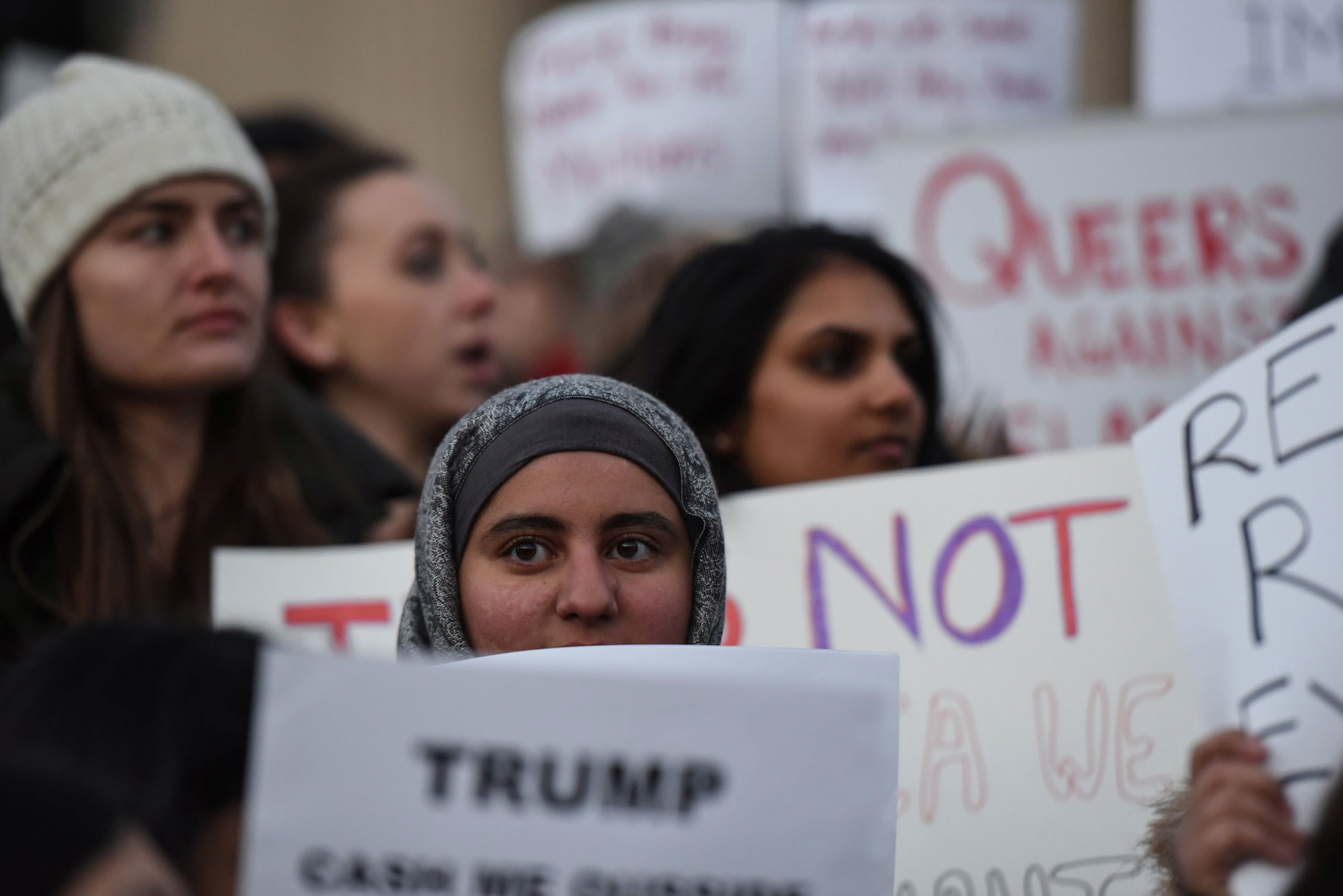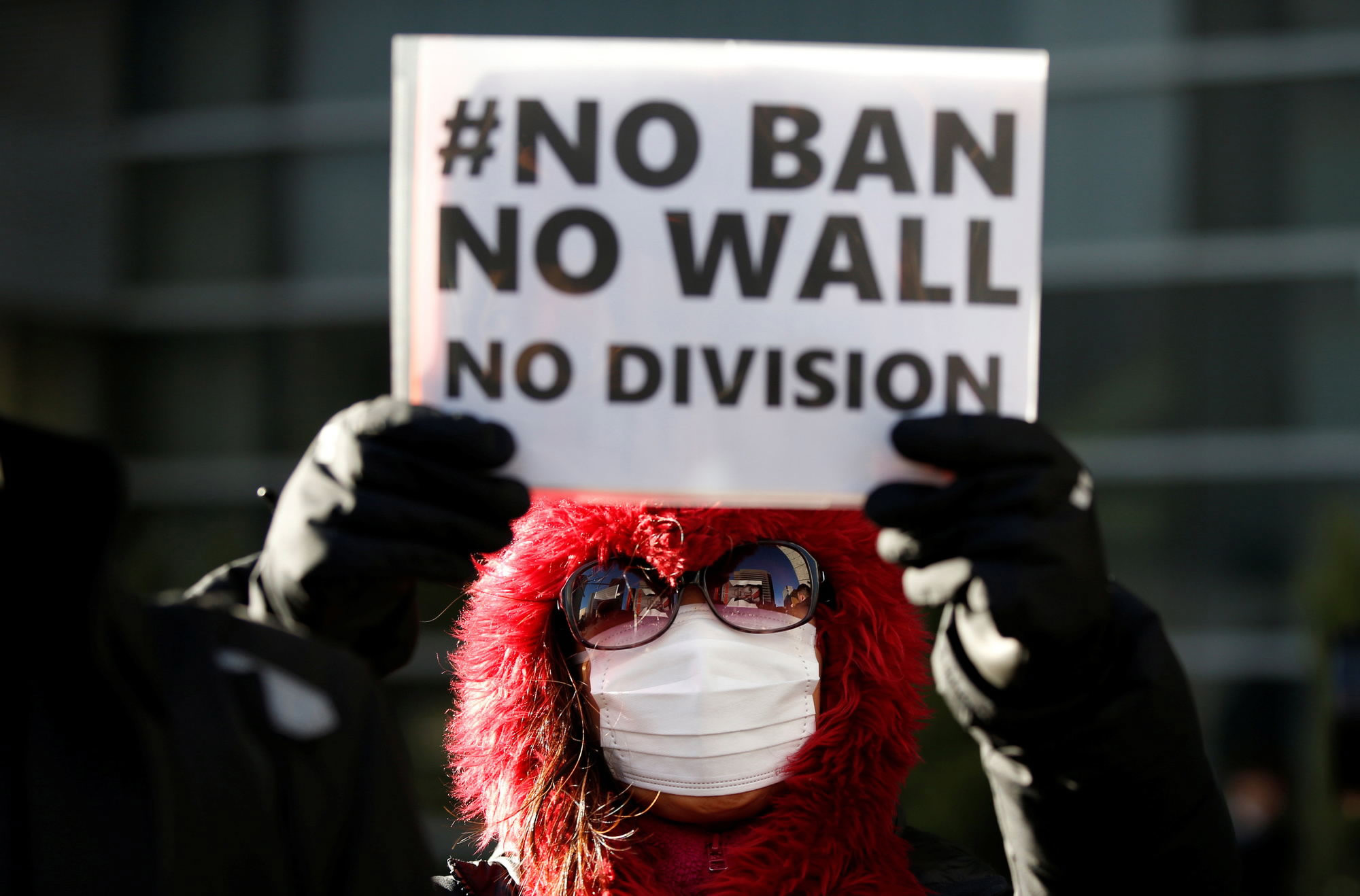Guest commentary by Hichem Karoui
Although a US court has suspended the Trump Muslim ban, and an appeals court rejected a White House request to reinstate it, the case is not over. The president still has several means to overturn the suspension and on Tuesday the US Department of Justice will be appealing again to have the ban to be reinstated.
But irrespective of whether the ban is reinstated or remains suspended one needs to remember that Trump’s immigration executive order actually has a long history.
In 2002 - the year following the tragic terrorist attacks on September 11 - the federal government created the National Security Entry-Exit Registration System (NSEERS).

People participate in a protest against President Donald Trump's Muslim ban at Columbia University in New York City, US on January 30, 2017. /CFP Photo
This federal program required non-citizen visa holders from certain countries (predominantly Arab and Muslim-majority nations) to register with the federal government. The registration process included fingerprinting, photographs, and interrogation. Once an individual registered, NSEERS required a person to regularly check in with immigration officials.
Trump has been elected on a policy program. Those who put him in the White House expected him to fulfill his promises. Among which was the Muslim ban.
In December 2015, as a Republican presidential candidate, Donald Trump made international headlines with his proposal to temporarily ban Muslim immigration to the United States. In the press release, Trump called for "a total and complete shutdown of Muslims entering the United States... until our country's representatives can figure out what is going on."
By "what is going on," Trump was mostly referring to a series of horrific and highly publicized terrorist attacks - including in Paris (France) and San Bernardino (California) - that had greatly deepened public fears about Islamic terrorism in the United States. He was also referring to the historic migrant crisis in Europe, and the US government's plan to accept 10,000 mostly Muslim refugees, fleeing violence and poverty in the Middle East.

A woman holds a placard to protest against US President Donald Trump's Muslim ban near the US Embassy in Tokyo, Japan on January 31, 2017. /CFP Photo
Whether his Muslim ban is legal or not is now a subject of internal judicial assessment.
The case may end up at the Supreme Court, which, according to Temple University professor, Peter J. Spiro, has never struck down an immigration classification, even on the basis of race.
For Spiro, this disinclination to interfere stems from the Court's infamous holding in Chae Chan Ping v. United States, an 1889 case in which the Court upheld the power of Congress to exclude Chinese laborers from immigrating to the United States on the basis of their nationality.
In Chae Chan Ping, the Court established what has become known as the "plenary power" doctrine, reserving for the political branches of government the ability to "exclude foreigners from the country whenever, in [their] judgment, the public interests require such exclusion."
While the policy of Chinese exclusion ended in 1943, many legal experts believe Chae Chan Ping technically remains law and continues to provide a basis for executive and legislative control over immigration.
But not all US law experts are in agreement on what Chae Chan Ping really means to the current executive order.
Some argue that although Trump's ban would be struck down as an unconstitutional violation of religious freedom if enforced against US citizens, non-citizens outside the country are not necessarily extended that protection. The US Constitution does not provide the same set of protections to aliens outside US geographic borders.
Others, like Constitutional Law Professor Lawrence Tribe of Harvard University, contend that constitutional protections do in fact apply to foreigners and that "targeting groups of persons, including non-US citizens, seeking to enter the US based on religion would violate the First Amendment."
While the debate is raging, airlines have resumed flights to the US airports, carrying travelers from the seven banned countries. We will have to wait and see how long they continue to fly.
(Dr. Hichem Karoui is Non-Resident Senior Fellow at Beijing Center for China and Globalization (CCG), and is also a diplomatic advisor and analyst. The article reflects the author's opinion, not necessarily the view of CGTN.)
11176km










